The talk about Android Netbooks has been mostly just that – talk – with the practical implementations limited and the commercially available products zero. But an innovative execution environment that allows Android Applications to run on Ubuntu could mean the first real “Android Netbook” isn’t an Android Netbook at all.
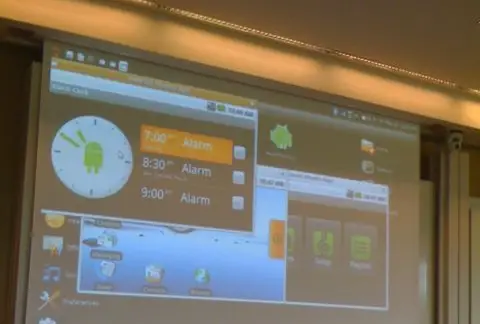
The environment, which apparently fools Android Applications into thinking they are running on a phone with patches for features like multiple windows and CPU idling, was shown at an Ubuntu Developer Conference in Barcelona, Spain.
It makes sense… at least on the surface and in the short-term. Ubuntu has already done the work of getting a Linux operating system running on a Netbook whereas Google’s Android hasn’t even begun to address this area. This particular execution environment compiles Android code to its own version of libc, mapping Android libraries to Ubuntu libraries in some places and spoofing them in others.
So why not Android alone in Netbooks? Leveraging Ubuntu could provide a quicker speed to market when all is said and done. And it might just be a better starting point:
Google’s platform is well-suited for phones and tablets but isn’t ready for netbooks yet. Intel’s Moblin project and Canonical’s Ubuntu Netbook Remix are better suited for such devices because they provide a more netbook-friendly user experience, support running existing desktop Linux software, and have better compatibility with Atom chips.
Android uses the Linux kernel, but it isn’t really a Linux platform. It offers its own totally unique environment that is built on Google’s custom Java runtime. There is no glide path for porting conventional desktop Linux applications to Android. Similarly, Java applications that are written for Android can’t run in regular Java virtual machine implementations or in standard Java ME environments. This makes Android a somewhat insular platform.
(Source: ArsTechnica)
How would Google feel about someone taking their Operating System and using an entirely different OS Layer to process and filter the applications? Given the stance they’ve taken up to now, the only approach they can really take is cautious and guarded optimisim, saying they are behind the Open Source community and Android is free for all to do whatever they want. If they were to expound at all, I think they would explain that Google is best suited to move the project forward.
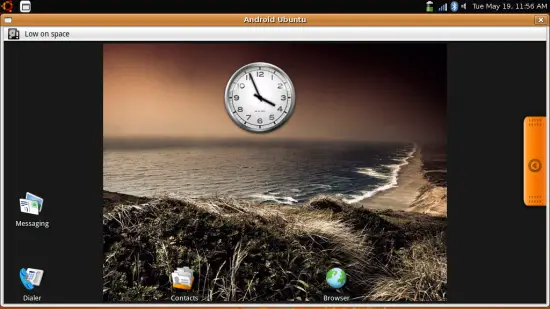
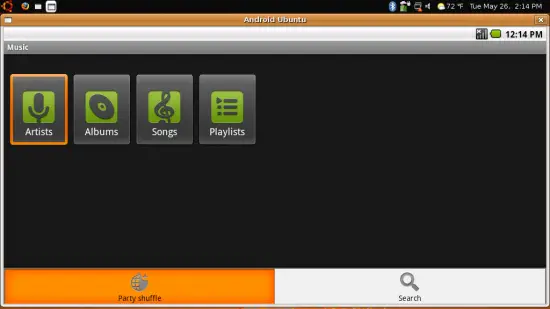
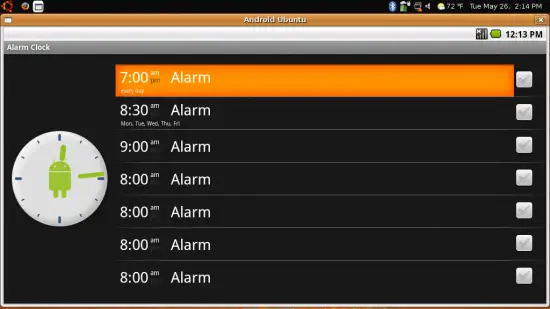
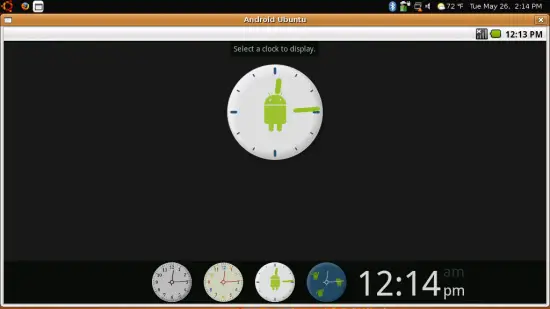
(pics from Michael Frey)
But if they’re really smart, they’ll highlight this development at Google IO and show developers all the awesome things being done with Android. And oh yeah… Google IO begins today… and boy oh boy are there a lot of possibilities.
Canonical is the commercial sponsor of Ubuntu.





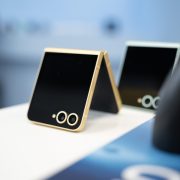

funny, google android in ubuntu,
while google runs on (a stripped down version of) ubuntu
its like opensource love…
This is so sweet.
Awesome, simply awesome. Next step: full synchronisation of Android phone data with desktop equivalents running on my Ubuntu box. That’s at least part of where I hope this all leads.
I think this is slightly backwards. I’d rather see Googles idea of a Java based desktop environment being ported to Linux rather than compiling the Android apps to C. I’m somewhat a fan of seeing things moved to managed code and I’d like that code to be Java rather than Mono/C#.
Its an interesting take, but to choose Ubuntu to run Android is kind of backwards. I could run android in a virtual environment on a Linux machine anyway. If someone is using Ubuntu, why would they want to run two parallel Window Managers – one for Ubuntu and the one that comes with Android. Also from what I understood, Android UI uses openGL and my experience with openGL under Ubuntu has not been pretty – at least on the common hardware. Its a great Idea, but they need to do a fresh new remix of Linux and Android – and leave the Ubunutu alone…
What no one seems to have mentioned is, why would you want Android on a netbook??
I can understand some applications which have access to your phone on a netbook would be useful i.e. an Android App running on your netbook, but surely you still want office and media players on your netbook too.
So this makes sense surely??
Admittedly running just a VM of Android (not an Android app) makes very little sense to me, running an Android app makes sense.
And what you all have to bare in mind is that Android is getting alot of attention from netbooks lately, where Ubuntu I think where getting alot of users on netbooks in place of ASUS default OS. I think this is just Ubuntu’s way of saying have your Android Apps on your netbook through Ubuntu – that way getting best of Android and Ubuntu on your netbook.
Nice, I am an Ububntu user myself.
Android is a complete platform and a phone OS. So running an Android app in Ubuntu may be a cool Proof-of-Concept, it defies the vision of Android – a Java like platform without the Sun’s (now Oracle) control on it. Yes we need Office and Media Player and Photoshop and games for Android, but what’s the point of running it on top of Ubuntu.
There already are Office Document readers for Android and plenty of Media players. The only thing it shares with Linux is a the Kernel – but Android Framework doesn’t give you control over Kernel. The Kernel can be replaced down the road e.g a Solaris Kernel or some Real-time Kernel. I would rather have an all Android OS than a hacked version of Android apps running in Ubuntu.
Kurtis appreciate what you are saying, but Android is a mobile phone operating system, why would anyone build a fully fledged office program for a mobile phone device?
Sure I can see that is they were used on netbooks to a point where development could be done to move open office (for example) to the android platform.
But for me I would much rather have my ubuntu install on my netbook and have it play nice with some Android App’s which I may wish to have on my computer (although I can’t think what kind of app I would want to use for this).
@kurtis and @Mattew Guant
Where the hell were you guys last week when I needed you!! I was all like “Android… netbook… why?!?” *sigh. If you haven’t read it already, check out the article on the android netbook made by Playstation… I mean.. some company in China.
http://phandroid.com/2009/05/14/alpha-680-android-netbook-poses-for-camera/
I admit, I was initially enticed by the idea of implementing Android on other platforms too… but then I saw THAT… and I realized that putting Android on a computer (that’s not a phone or tablet), is like giving a spork to 50 foot giant: useful, but highly inadequate.
This is so cool, but I hope there is comming a real android pc OS. As i read lots of comments about why and office for a phone? I ask you one thing doesnt windows mobile has that also and isnt that great? Everything is with every thing connected. One full sicronisched system!
I think this is just the beginning of something that could be very exciting.
Android, Moblin & Ubuntu each have their own unique strengths. The challenge is to find the right formula, to blend them together.
I agree with Matthew. I don’t feel there is a real practical use for running Android or Android apps on a netbook.
I’ve been using Palm PDA products for years. My current Palm TX is a little computer in my pocket, capable of all sorts of useful tasks and holding a wide variety of information that I want available “all the time”. This goes so far beyond the basic built-in apps that I have six pages of apps in my TX’s program launcher. But there are also times when I’ve been working at my computer and found myself wishing I had the exact app and data on my computer that I have on my TX. If there is a desktop “equivalent” app and my data is available for that, great (i.e. Dataviz DocsToGo on my Palm and Office on my desktop). But there are apps and data on my Palm that I can’t get at via the desktop.
What I want to get to is a fully Linux based operating environment for all of my computing needs, including my cellphone. And I want all my data on my phone to be available on my desktop via a complete synchronisation of data and to have the corresponding apps on my desktop that can access that data. So if Ubuntu lets me run Android apps, I can certainly see a value in that, specifically if this first step of allowing Android apps to run on the desktop eventually results in the ability to completely synchronise data between the two “computers”.
Darion you are spot on – everything should be sychronised and working together, so why not synchronise why Ubuntu OS? :-P
I think at the end of the day this will boil down to personal taste, if people are willing to write the netbook like apps for the Android platform. I think Ubuntu has done this to get itself back in the light of netbooks since so much emphasis has been on Android on netbooks.
I.M.O. Microsoft are going to make a big mistake if they choose to go down the Windows 7 Starter root (http://blog.gauntface.co.uk/2009/04/20/netbooks-linux-windows-what-to-do/) – people will want another option and hence the reason for why Ubuntu came up with Netbook Remix – If Canonical can get Android phone syncing nicely they will achieve something alot of people have been getting annoyed with (phones not syncing with Ubuntu). Like I said if Android gets the right apps and someone can make it easy to install or netbook manufacturing decide to pre-install it then maybe Android will be another choice.
Conclusion : It’s an open market for Netbook OS’s where money is the biggest concern
Right just found the first application I would be wanting to have on Ubuntu which is running on Android – Spotify
Well, I think this could be usefull to limited hardware. I mean, we can try work this pice of enviroment, under old hardware, or may be, some small processor, like VIA C3. I will try work in it, and I will post my results. Nice Post.
Much as like my droid, it is small and inconvenient for
setup/configuration/maintenance. I would like something
like VNC where I could remotely work the Droid from my
Ubuntu netbook. Bluetooth might be preferable for low power,
but I would be happy with USB or wifi. It would also be
nice that the PC would have a complete backup of the Droid
for disaster recovery and then let’s get the apps sync’d.
Where is Tomboy?
Thanks you very much
D
So, a phone that runs ubuntu, or is it ubuntu that runs the phone, perhaps GSM plugin for my netbook (what part do I put to my ear?) Surely all we need is a vnc/rdp webclient to access any desktop we choose?
The real issue is who trusts google?
I think this is awesome, I would love to be able to have Android apps running as widgets on my linux machine. I would also love cool apps like Shazam and iMusic…also, if you want to put ubuntu onto a small device, why not have the ability to take apps from an operating system designed for smaller devices? You might want to have the ability to use OpenOffice, or what have you, but you might also want to use some of the apps designed for the mobile devices…just a thought.
Does anybody know how to get in on this? I would love to beta and help develop this!
It’s cool but it should better support normal and good webcams, and work faster
i think android and ubuntu is a great idea. i have a hp tx2 with 12″ touch screen. perfect hardware for this setup since ubuntu already supports touch for it. ive used the vm with android and touch works great. everything is going to have touch in the future even netbooks or tablets, we already see on phones. android is good with touch almost as good as iphone. ubuntu is in the game to win. im sure we will see great things.
Im not a programmer, im super-novice in terminal in ubuntu, and haven’t even rooted my droid.
However I do use ubuntu as my main machine and have a droid x. I would love if I could synch everything in my phone with a vm or some kind of integrated programming for phone experimentation purposes. The droid netbook shown by Grant does look sweet!!
anyway I digress. Id like to see more movement in the direction of being fully able to integrate a droid and a linux machine, so this is an encouraging step.
If it bothered Google that people are hacking ‘droid to work in Linux and other OS’s then they wouldn’t have released it with any part of android with an open licence.
the author makes it sound like Google is frowning upon people getting android to work everywhere. like that is a bad thing or something.